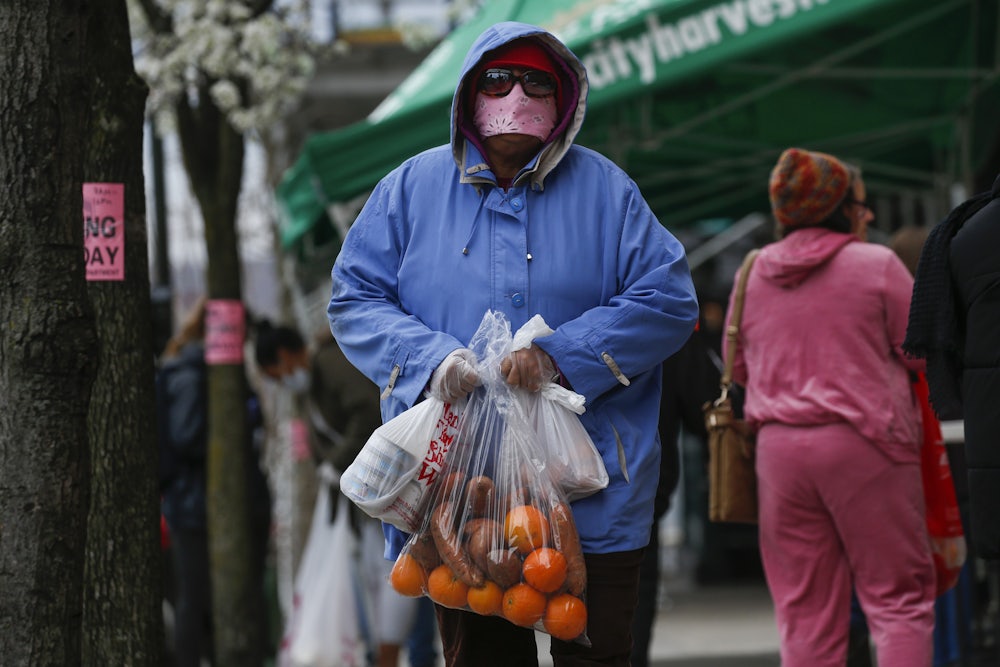The first of the month has come and gone. For many people in this country, the anxiety that the day usually brings was compounded by the nationwide pandemic that’s upended life as we know it. Rent, phone, and utility bills, on top of the week’s groceries and childcare costs, were already an overwhelming burden. Now, thanks to the coronavirus, they’re an impossibility.
Across the country, landlords and renters alike have been forced to grapple with this new normal, be it by coming to an amicable understanding or by tenant-led rent strikes. Parents have been forced into a corner, stuck between reporting for work and paying the bills and ensuring their kids have childcare. There are no easy answers for the majority of working people, because the system was not built to sustain them but to squeeze them. With a collapsing economy that is somehow only making some wealthy people wealthier, it is people in poverty or flirting with it, workers across essential industries, and millions of other regular people who are left shouldering the heaviest burdens.
The response from public-facing institutions has been to embrace and explore this reality rather than gloss over it with smiling human interest stories. The Today show explained how to apply for unemployment. USA Today examined how the virus layoffs are disproportionately affecting marginalized communities. In the political realm, unrelentingly conservative state legislatures like Wisconsin’s and North Carolina’s are temporarily setting aside their dreams of austerity to quickly get money in the hands of the unemployed. There is no denying that the current response has not been strong enough, especially from the White House and Congress, but there more or less seems to have been an acceptance that politics as usual will literally kill us. This then raises the question: Why haven’t they always been this diligent?
Entering the pandemic, roughly 60 percent of the country was a single emergency or missed paycheck away from debt. Chances are, you knew about the average person’s typically thin savings account, how a random $500 or $1,000 bill would bankrupt the majority of households. It’s been floating out in the internet and human interest ether for years now. And right alongside these same reports about the thin margins so many of us live on sit articles and posts telling us that we should have at least three months of expenses saved up at all times or that we should have a full year’s salary in our savings account by the time we’re 30 years old. These, of course, are insane, unreasonable, and nakedly contradictory things—and yet the latter passes for some version of common sense on morning news shows or soft focus news pieces on financial responsibility from the same outlets now running how-to’s about applying for unemployment. A savings threshold at that level is wildly out of reach for most people but remains a clear testament to America’s desire to brand “success” as glossily furnished open-floor-plan houses and upper-six-figure incomes.
There’s plenty of blame to dish out for this inaccessibility—an inadequate governmental safety net and the deregulation of labor standards, for starters—but it’s worth considering, for a moment, why it’s just now that our elected officials and mainstream consensus are beginning to grapple with—however unevenly—how tenuous daily life really was this whole time. It’s taken a pandemic of historical proportions to jar the nation’s senses and remind the lucky few who occupy that tax bracket of the financial ruin that looms over so many. Student debt was a weight on far too many young Americans; rent strikes were being conducted to protest substandard living conditions; daycare was on the brink of becoming a national crisis. The numbers have always been real people—lives lived under a heavy burden and perpetual uncertainty—but we are finally facing what they mean in real time.
In an ideal world, or really in many countries other than the United States, the response to unprecedented unemployment claims would be to actually invest in protecting workers. It would be passing laws that double or triple the federal minimum wage, ensuring paid sick leave and paid time off even outside of an emergency, codifying renters’ rights, and it would be taking a long, sobering look at the outrageous state of childcare. There would be urgency where instead exists complacency.
But corporations and Congress are instead occupied with making sure the poorest workers don’t get an accidental raise. Which is both discouraging but predictable. These kinds of bad actors have always had their hands on the lever of power. It is up to the workers to organize and reflect their contempt with meaningful action, as they have in the past weeks at Amazon and Instacart. What the coronavirus has provided is a light exposing all of our country’s dark corners. Before the pandemic, America was no friend to the average sucker just trying to make a living. And even as we’re living through the greatest public health emergency of recent history, far too little has changed.
